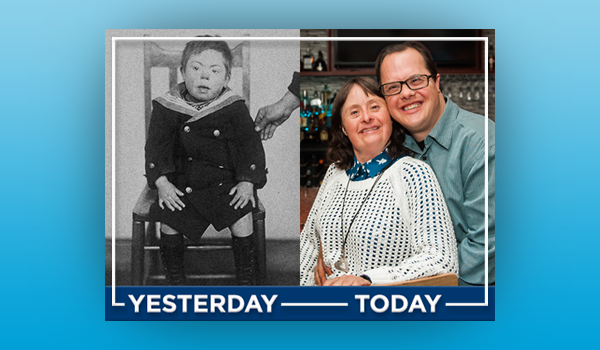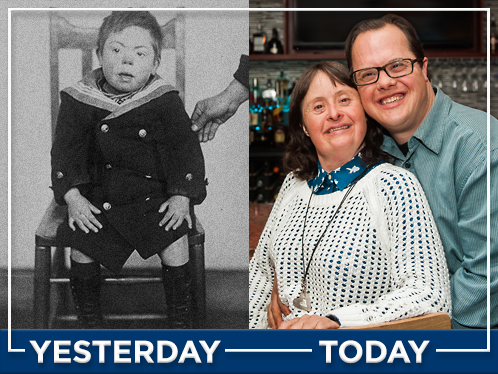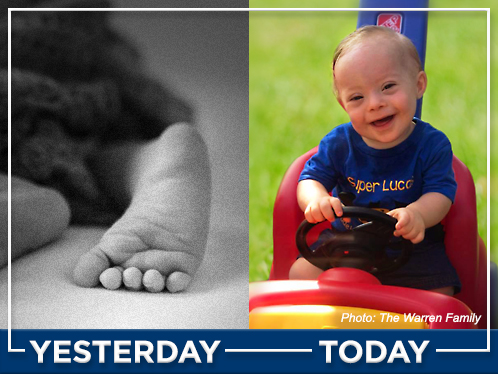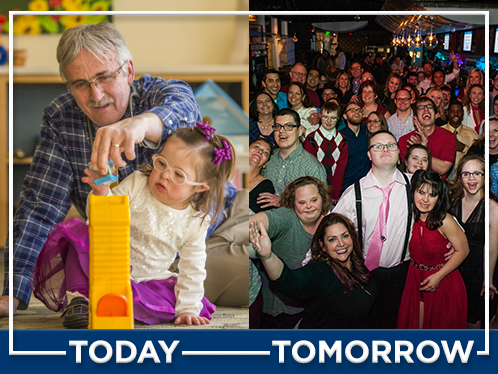
Yesterday & Today: World Down Syndrome Day 2018
Global Down Syndrome Foundation recognizes World Down Syndrome Day as a chance to reflect on the progress we have made, and on our hopes for the future.
 |
YESTERDAY: The life expectancy of a person with Down syndrome was only 28 years in the 1980s.
TODAY: Today in the US, the life expectancy is nearly 60 years!
The discrimination against people with Down syndrome can be profound. Children and adults with the condition are still deprived of lifesaving medical care. There are also too few medical professionals who understand that patients with Down syndrome are highly predisposed to certain diseases and highly protected from others.
At Global we are working to continue this significant increase of lifespan for people with Down syndrome through improved medical care.
 |
YESTERDAY: In the US, people with Down syndrome weren’t allowed to attend public schools until the 1970s.
TODAY: Students with special needs get a free and appropriate public education required by law.
Despite many advances since the 1970s, so many parents are still battling the education system to enforce their rights. At the same time they are trying to unlock how their children and adults with Down syndrome can learn better.
At Global we are working to help ensure improved health outcomes (including in sleep, speech, hearing and vision) that we believe will allow students with Down syndrome to reach their true potential.
 |
YESTERDAY: In the US, the accepted terminology for people with Down syndrome used to be “mongoloid” and “mentally retarded.”
TODAY: Thanks to Rosa’s Law, “mental retardation” was replaced with “intellectual and developmental disabilities” in all federal documents.
We believe in freedom of speech. But we also believe that our community must demand respect through language, and stand up to those who would bully us with words. Through our training and our advocacy we educate medical and research professionals in “people first” language and we have stood up to bullies using the “R” word and worse.
At Global we are advocating for equality and respect in Washington, D.C. and throughout the world.
 |
YESTERDAY: In U.S. hospitals, starving a baby to death with Down syndrome, or another intellectual disability, was allowed until the 1981 passing of the “Baby Doe Law.”
TODAY: This year we are celebrating Lucas Warren as the “healthy, happy, perfect” 2018 Gerber Spokesbaby – Lucas happens to have Down syndrome!
In Iceland, Denmark and other countries where the government boasts a “Down syndrome-free” future, the eugenics framework is marked and frightening. Standing on the shoulders of our human and civil rights predecessors of the 1960s and 1970s, we must be vigilant to ensure that our children and adults have rights, and are valued, equal citizens – in the U.S. and abroad.
Global advocates for our government to invest in people with Down syndrome and for people with the condition to be recognized throughout the world.
 |
TODAY: The Sie Center for Down Syndrome at Children’s Hospital Colorado provides life-saving and life-changing medical care to over 1,400 children with Down syndrome.
TOMORROW: Global envisions a world where we are able to establish a network of pediatric AND adult medical centers providing EXCELLENT care to millions of people with Down syndrome!
On this World Down Syndrome Day, Global is grateful for the amazing progress we have made together—we have created a pipeline of excellent science that informs our excellent medical care benefitting thousands of people with Down syndrome.
To be sustainable and to GROW so as to help ever more people with Down syndrome, we are grateful to you for your on-going support and trust in us to make a positive, tangible difference.
THANK YOU for allowing us to save and improve lives. Happy World Down Syndrome Day!!


 Experience our inspirational and groundbreaking videos and photos. Our children and self-advocates are beautiful AND brilliant!
Experience our inspirational and groundbreaking videos and photos. Our children and self-advocates are beautiful AND brilliant! Make sure your local Representatives are on the Congressional Down Syndrome Task Force.
Make sure your local Representatives are on the Congressional Down Syndrome Task Force.